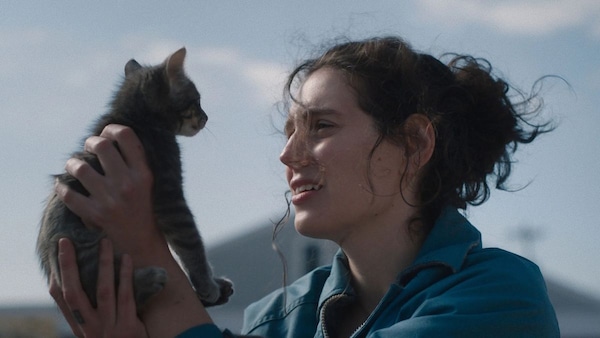Sorry, Baby Is A Sensational Debut By Eva Victor
OTTplay's critic Ishita Sengupta reports on the buzziest titles from Sundance 2025. Here: Sorry, Baby

Still from Sorry, Baby. Sundance Film Festival
Last Updated: 06.03 PM, Jan 30, 2025
THERE IS SUCH A THING AS A FESTIVAL DISCOVERY. When you walk into a theatre blind and watch in awe a film taking shape and culminating into everything you wanted to see but did not know. There is such a thing as a film seeing you in a crowd, acknowledging you for what you are and smoothening the jagged edges of what has become of you. Like offering a handshake in the dark. Eva Victor’s Sorry, Baby, which premiered at the Sundance Film Festival, was that film for me.
The description on the festival website was vague: “Something bad happened to Agnes. But life goes on… for everyone around her, at least.” It said something and nothing. Something bad happened to Agnes (Victor), the tall, awkward protagonist of the film who lives in a quaint house and is overjoyed every time her best friend, Lydie (Naomi Ackie) visits her from New York. They sit on a couch and collapse into a lived-in comfort of years. You look around and see no one else around. When they meet their other friends from college, Agnes is asked, “Do you still live there?” Her gaze falls and Lydie holds her hand beneath the table. But even she has her own apprehensions. “Don’t kill yourself,” she urges. “I won’t,” Agnes reassures with a certitude that implies that she had considered it.
Something bad happened to Agnes and she cannot leave the house she grew up in. Lydie tells her she is pregnant and Agnes says she does not see herself growing up. Something bad happened to Agnes and now her life is stalled.
Victor, the American comedian who garnered fame by posting funny videos on Twitter, makes her directorial debut with Sorry, Baby, a startling feature imbued with a clarity of voice that hits one like a block of ice. The narrative is infused with caustic humour (it feels a lot like Fleabag — a compliment) that thrives on absurdity and makes the nuances of the premise more accessible with its lightness without making light of it. The balance is nothing short of astonishing and gains more insight once the revelation drops. Something bad happened to Agnes – she was assaulted by her professor. He was her graduate advisor; she trusted him and he betrayed her.
Sexual abuse lies at the heart of Sorry, Baby. The film acknowledges it in every frame but chooses to showcase the outcome and not the act. The shift heightens the hideousness. We see a house and its bolted door. Outside the sun sets and night falls; our sense of dread grows. When Agnes comes out, her shoes are untied and her walk is funny. She drives home in a daze and recounts the incident to Lydie. She halts and pauses, repeats and forgets details, convincing herself before anyone else that it happened to her.
It is a sensational moment that distills the disorienting aftermath of abuse and the intent of Sorry, Baby, a film less interested in the specifics of assault and more committed to depicting the exhaustion of living with it. Victor grounds the largeness of the experience and scatters Agnes’ life with the smallness of it, drawing out in the process a gut-wrenching portrait of a life that rushes without moving ahead. The humour is built into the discomfort of witnessing it.
Divided into chapters and unravelling in a non-linear manner, the film tracks Agnes through the years. She gets a job as a professor, lives with a rescue cat at home and occasionally hooks up with her neighbour (the thoughtful Lucas Hedges). None is the matter on the surface yet Agnes has become a bit of a recluse, prone to panic attacks. When we see her for the first time with Lydie, she gives her a funny demonstration of how men behave in bed. Her friend adds to the impressions but in retrospect, the moment underlines the contrasting relationships the two women share with intimacy. Trauma has rendered Agnes a bystander to her own body.
It has also seeped into her and mixed with her blood. Victor frames her observations with a routine candidness that underlines the ubiquity of it all, like Agnes waking up, even after years, fearing someone is on the other side of the door, finding herself troubled on chancing upon a familiar word, and turning ashen on seeing someone who looked a lot like a person she knew in the past. They keep circling the narrative, adding up little by little to answer the one question the film stands on: what does living with trauma look like? Like speaking in a language that no one understands.
The title then opens up as much as an apology to the central character as much as an apology all women are entitled to. For those who sleep with the face of their perpetrators hanging before their eyes, or are yet to comprehend the extent of mistreatmentment they were subjected to. For those forever fated to survive while watching others thrive: sorry, baby.

 Premium
Premium